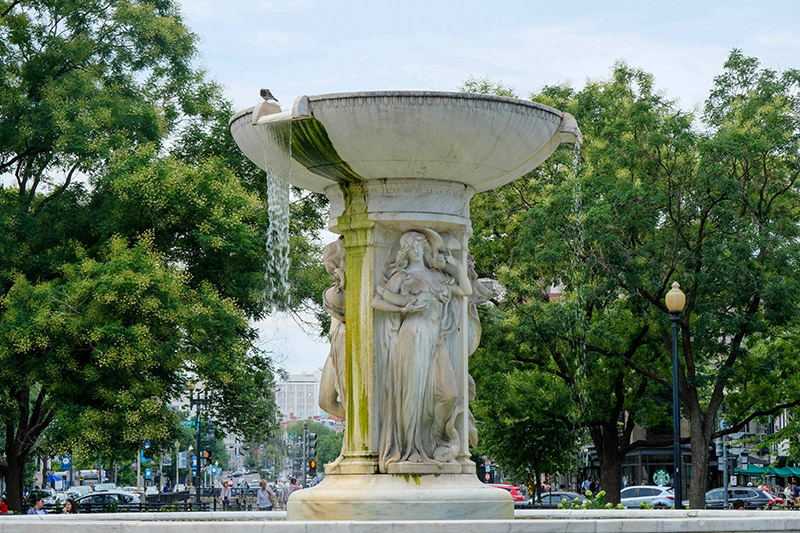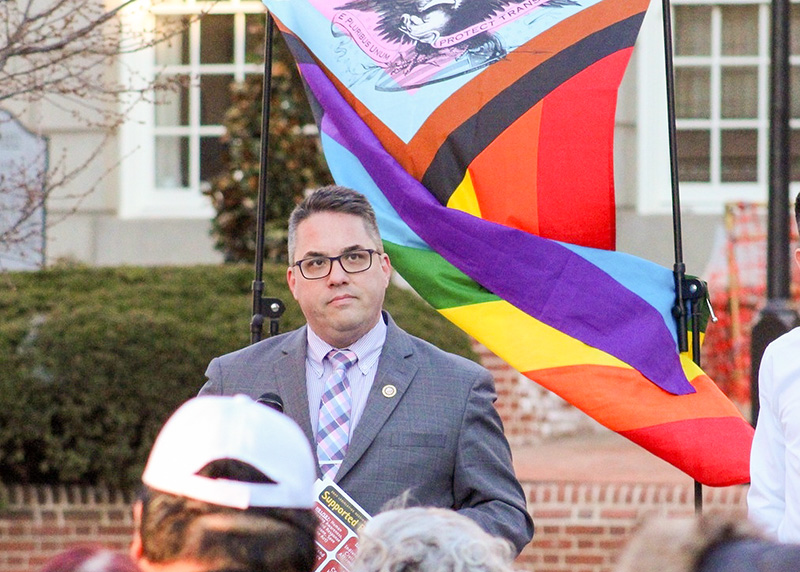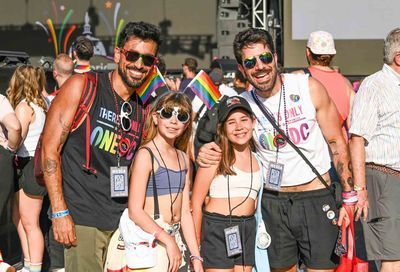12 Questions for LGBTQ Ward 5 Candidate Zachary Parker
Zachary Parker, an openly gay man, is running for the open Ward 5 D.C. Council seat in the upcoming Democratic primary.

Zachary Parker – Photo: DC State Board of Education
On March 30, Zachary Parker, the Ward 5 representative on the State Board of Education and one of several candidates running for the Ward 5 seat on the D.C. Council, posted a 2-minute video on his Twitter account, with the caption “Unapologetically me.”
“Hey everybody, it’s Zach. I came to share some personal news, which is, I am gay,” he said in the video. “I am very proud and confident in who I am and who I’ve always been. … I thought it was important for me to come share my full self, especially in light of rising violence, legislative violence, and homophobia across our country. And here in D.C., where some 40% of all homeless youth are LGBTQ+.
“I’ll tell you that there are many community leaders who have encouraged me not to share this news, in part, because they recognize that homophobia is alive and well,” he continued. “At the same time, I haven’t wanted to make my identity the centerpiece of my campaign. Instead, I wanted to lead with substance and on the issues, and that’s exactly what I’ve been doing.”
For some who had not been previously aware of Parker’s sexual orientation, the news came as a surprise. But the reaction was largely understated, at least as voters were concerned.
“I think a lot of people were inspired by my sharing my story,” Parker told Metro Weekly. “I’ve gotten a lot of notes from folk in the LGBTQ community just simply to say, ‘Thank you. Thank you for using your voice in this way.’ I didn’t really think of it as being inspirational, but I’m glad that it did land that way.
“I’ve been really proud of my community for the ways in which I’ve sensed that for many people that it is not going to stop them from supporting us on June 21. That confirms for me what I know is that we are better than the bigotry and the divisiveness that some people would like to stir up in using one’s sexuality as a reason not to vote for someone.”
That’s not to say the news was received well by all. One of Parker’s primary opponents, former Ward 5 and At-Large Councilmember Vincent Orange, questioned the timing of Parker’s announcement. During a May forum hosted by the Capital Stonewall Democrats for Ward 5 candidates, Orange called Parker’s announcement a “matter of convenience.”
“Twice I’ve heard Mr. Parker say, ‘Well I’m openly gay and I’m espousing to help.’ But he was an elected official for almost four years, and all the things that we’ve discussed here tonight, he could have helped those young kids, he could have helped adults by just being that proud LGBTQ leader,” Orange said.
“So I don’t understand, and I’m puzzled because so many others have said, ‘This is who I am, I’m proud of it,’ and reached out and helped others. But to just become openly gay a few months ago seems to be a matter of convenience, and now to say ‘I’m going to be the openly gay person on the Council,’ it just doesn’t add up to me.”
Orange later apologized for his remarks.
Parker says that while he identifies as a “proud Black gay man,” he never thought his sexual orientation was particularly relevant to his duties on the State Board of Education.
“Not that I’ve lied about it or hidden it, but I just haven’t made it a point to talk about my personal life,” he says. “I know many people often don’t talk about their sexuality or who they fully are, in part because of safety, but also in part because it’s no one’s business and so I don’t criticize those that don’t fully share or are not at a point to share. During my time on the State Board, I haven’t felt like I couldn’t share. I was just focused on work and so it never quite came up, and my work in the community has been focused on the issues that matter most to people.
“I felt in this race, I owed it to myself to just be my authentic self and to share more fully myself with residents and voters. Admittedly, I don’t love the term ‘coming out’ because I think it subtly reinforces the idea that gay folks need to justify themselves to heterosexual folks. So, I just see it as more of I’ve invited folk into the more full context of who I am.”
A former teacher, Parker is seeking the open Ward 5 seat currently held by Councilmember Kenyan McDuffie. He faces a host of opponents in the June 21 primary, including Orange; Gordon Fletcher, an ANC Commissioner and American University professor; Faith Gibson Hubbard, the director of the Mayor’s Office of Community Affairs; former ANC Commissioner Kathy Henderson; and political activists Art Lloyd and Gary Johnson.
Parker has carved out a space within the more liberal/progressive lane of mainstream Democratic politics, emphasizing issues like government reform, criminal justice reform, creating “deeply affordable” housing, fostering generational wealth in communities, enforcing fair labor laws, and supporting returning citizens who have previously been incarcerated.
Within minutes of meeting, he’ll rattle off an extensive list of priorities he’d like to see achieved in his home ward, which covers the bulk of the District’s often-overlooked northeastern quadrant.
“There are what I would call ‘food deserts’ in several places across the ward. We don’t have a hospital east of North Capitol Street, and there are what we would call ‘care deserts’ in many parts of Ward 5,” he says.
“In recent years we saw community-based mental health resources slashed. I’m proud to have been one of the elected officials in the city, during my time on the State Board, advocating to reinstate those mental health services, and I’m glad they have been reinstated. But it speaks to a need for a more coordinated healthcare system, a coordinated nutritious system, and that is the vision for healthy communities.
“‘Healthy communities’ is not just some empty slogan, but is about how we quantify the elements that all communities should have access to: safe streets, good schools, health care, grocery stores, and the list goes on. We need to identify those areas that don’t have those things and then through policy, oversight, and accountability, make sure that we bring those resources to neighbors that need them the most.”
METRO WEEKLY: Let’s talk about your background.
ZACHARY PARKER: I am the current Ward 5 Representative on the D.C. State Board of Education and the immediate past President of the State Board. I live currently in Ward 5, in the Union Market area near Trinidad. I’ve lived in D.C. for almost about 10 years. I’m originally from Chicago where I grew up, although I’ve had family that have long lived here in the D.C. area and some that are now living in Maryland because they can’t afford to stay in this city as it changes so drastically.
As you may know, I’m running for council with this vision of building healthy communities for our neighbors where basic needs are met and where we fundamentally disrupt cycles of corruption, displacement, and violence.
There are many things to celebrate about the work of the current Ward 5 Councilmember Kenyan McDuffie. I applaud him for elevating racial equity and justice on the council for pushing for legislation that would center that in our policy making.
At the same time, there are several ways that I look to be different. Namely in being more present and visible in the community, making sure that we are advancing bolder policies to meet the basic needs of all neighbors, and building a more inclusive Ward 5 environment where all folks, regardless of background, zip code, sexuality, race or makeup, are able to thrive and live and coexist peacefully.
MW: What would you say your top priorities are should you be elected to the Council?
PARKER: There are a number of priorities that I have. Folks can check out my website zacharyforward5.com. You’ll see no less than a dozen policy platforms and that’s important because I wanted to lead with substance and detail about my vision for how we can emerge from this pandemic.I would say what’s top of line for all neighbors across the city, but also in Ward 5, is violence. So a key priority for me is around addressing the root causes of violence, which is connected to a need for educational opportunity, economic or jobs in the community, as well as recreational opportunities for both our youth and everybody else.
I believe we have a system right now that is a bit reactionary and our policy prescriptions are reactionary and I think we need to double down more on the preventative side to address the rising uptick in violence, but also to make sure more of our young people are not falling into the criminal justice system. There’s a policy platform I have on my website that talks in more detail about that as well.
MW: How do you ensure equity in accessing resources? For instance, the lack of urgent care options for medical emergencies could leave residents forced to take a bus halfway across the city to get to the nearest urgent care center or emergency room. How do you ensure equity when there is no facility in the ward or anywhere nearby?
PARKER: It is not easy to just build a hospital in the heart of the city, although it is possible. I support innovative ideas and programming where, for instance, we could set up satellite care units and use existing infrastructure like our rec centers. I support extending urgent care hours to evenings and weekends so working families and individuals can actually take care of and have access. I also support innovative organizations and programs that provide in-home care where maybe the care comes to you versus having to seek out, “How am I going to get to this location?”
A lot of those organizations already exist, and so as a government, it could be about, “How do we scale these programs that are proven to be effective to bring care closer to those that need it most,” while we also think about and fund more long-term planning around making sure Ward 5 has a hospital or care facilities in parts that currently don’t have them.
MW: With respect to LGBTQ issues, there’s been an emphasis on dedicated funding, for a permanent LGBTQ community center, as well as for any number of initiatives related to LGBTQ youth homelessness, housing, workforce programs, and the like. The mayor has included some of those priorities in recent budget proposals. What services or programs benefitting the LGBTQ community do you see a need for?
PARKER: I’d love to see LGBTQ resource centers in all parts of our city in every ward. I would love to see increased targeted housing directed at LGBTQ youth, especially since in D.C., 40% of all homeless youth identify as LGBTQ. We know that that stems from homophobia as well as families having a low tolerance for their young people coming out and/or being their true selves.
We also know that we need increased access to affordable life-saving drugs, both on the preventative side like PrEP, but also to address illnesses of all kinds. That is a huge disparity that I would love to see in those community based resources that would be spread across the city.
We need safe spaces for people to convene. Obviously, we saw there was a big fight in Ward 6 with the opening of a bar and restaurant there. I would love to see just more safe spaces where folk, regardless of their background, but in this context the LGBTQ plus folk can go and feel safe, feel seen, and enjoy. We could do that through grants, we could do that through more targeted funding.
MW: D.C. still has HIV infection rates, especially among younger men who have sex with men. There have been attempts to engage communities in treatment as prevention method if they are positive, or to link them with PrEP and PEP if they are negative, and to encourage people to get tested for the virus. How do you see the district’s current HIV strategy, and what would you change about it to reduce the number of new infections?
PARKER: Globally, we’ve seen research and resources dedicated to HIV and AIDS take a hit because of the pandemic. That is true here in the district as well, given that we are grappling with this global pandemic. You raise a great point, that there’s still a lot of work that needs to be done. In making sure that we educate people about the resources available to them is an issue across agencies and issues, and namely in terms of life-saving drugs, resources, programs, and treatments.
I think it’s about dispatching street teams. It’s about bringing care to communities. Often times I say we expect people to seek out care, when we should reverse that. I think the disparities that exist in low-income communities, often times communities of color, are disproportionately higher, and that is often those same communities that are cut off from digital access, that are cut off from basic amenities and neighborhood resources.
I would love to see units be dispatched to educate and inform. I would love to see more care closer to home. Again, using our rec centers as community zone resource hubs while we work to build those LGBTQ centers in each part of the city. So I think that is the key focus around how you bring care and information to people.
MW: Some people have floated the idea of bringing back the “Orange Hat” patrols of the ’80s and ’90s to address public safety concerns. Do you think that’s a good idea or bad idea, and what are your thoughts about that program serving as a form of outreach to the community?
PARKER: That is not part of my vision around either public safety or how to engage and inform community members. I don’t think, for a host of reasons, the Orange Hat Patrol is the way to go — nor do I think that should be our focus for preventative steps to address rising violence.
MW: Housing is one of the more pressing issues that gets raised every election cycle. There’s a high cost of living in the city. Rents are skyrocketing. As you noted, people have been getting displaced for the past decade. What steps should we take to help both homeowners and renters alike when it comes to housing?
PARKER: Affordable housing is another issue that is top of mind for voters. It is another key priority of mine. As we emerge from this pandemic I’ve long said that we can’t give into this “either/or”-type dynamic, where we’re going to either fight for tenants or we’re going to fight for landlords. In fact, I advocate for making both whole, extending protections to make sure people are not evicted. Some 40,000 households in the district face eviction right now and we have the resources and the means to make sure we stop that avalanche of evictions.
At the same time, landlords are due the resources and money owed to them to make them whole. I think we should make sure we do that. Make landlords whole while also staving off evictions.
As we move forward though, I argue that government has a critical role to play in expanding affordable housing. One, by seizing public land and making it permanently affordable for the development of affordable housing. Two, by expanding vouchers that would allow those that need deeply affordable housing, it more viable for them. Three, making sure that we expand the HPAP program and rethink about the income qualifications.
A lot of programs often times you don’t qualify for, because you make a little bit too much, but at the same time you can’t afford, $3,000 or 4,000 rent, nor can you afford to a mortgage that’s $800,000 or $900,000 and up, which is what homes in Ward 5 are going for in many parts.
Then lastly, I would just say making sure that we expand rent control. I support expanding rent control throughout the city, closing loopholes so that tenants are not taken advantage of and that they can afford to stay in the city.
The list goes on. And again, neighbors can view my website to read more in detail about the policy because I think also how we support our seniors, many of whom bought their homes for a fraction of what they’re going for now. They are slammed with skyrocketing taxes, which make it hard for them to stay in their homes. I think government has a role to play there by expanding grants and neutralizing those conditions so that our seniors can stay in the communities that they have known.
The headline here is that government has a role to play, because our status quo and market-rate pressures alone will not get us where we need to go.
Last thing I would say, I do support this idea of expanding affordable housing across the city, in all parts of the city. I applaud the city on that. I do support this idea of setting benchmarks and metrics and aggressively pushing towards those. The Urban Institute said that we could even go even further and maybe go to 40,000 or 50,000 affordable housing units. So my vision is focused around how do we do more, more quickly, and meet the needs of communities like LGBTQ youth, seniors, and others who may need affordable housing.
MW: In terms of expanding eligibility criteria, what do you see as a revised income threshold. How could eligibility for the HPAP program be expanded?
PARKER: It’s literally subsidizing the programs that already exist. Some of those programs are federal in nature and they have very rigid income levels or qualifications, rather. I think the local government can also subsidize to supplement what an individual would qualify for. I don’t want to get into which AMI level works, but you’re exactly right: we need to do more for everyone. I advocate for more deeply affordable and targeted housing for those at the lower rungs of our socioeconomic status.
I can also tell you as someone who is not low-income, it is still very hard for me to go out and buy a home in Ward 5 not only because of the price tag, but because of the bidding wars that have become a part of the culture in the home buying process, where developers are able to put down cash on the table and then maybe you have a competitive bid, but you don’t have the resources to go back and forth.
In terms of the HPAP program and other programs like that, I think it’s about how we inform our neighbors what programs are available to them, through by education and bringing resources to them, as well as helping them apply for those programs. I helped more than 100 Ward 5 seniors take advantage of a Stay in DC Program, which was a government-provided resource for folks to stay in their homes. The application took anywhere from 45 minutes to an hour to complete.
On one end, it’s about creating the program. The other end deals with how are we implementing it to make sure it gets to the people that need these resources the most.
MW: What is your vision for connecting people who have been victimized by, or suffer trauma as a result of violence with the resources they need?
PARKER: That is a very serious issue. In my violence prevention platform, I call for expanded community-based mental health, but also targeted counseling, therapy, and support for individuals that are victims of crime. At the same time, we need to make sure we’re working to prevent crime. We know crime is going to happen.
I believe that those that perpetuate violence need to be held accountable and those who are unfortunately the victims of violence need the support to get back on their feet. That includes those that may be victim of rape or robbery. Those things linger and create traumas that can impact one’s quality of life. I would love to see a robust mental health approach to our public safety in the city and that will certainly be one part of it, as well as mental health resources for those who are victims of crime.
MW: When it comes to the issue of sex work, do you support decriminalization, and what would you propose in terms of the bigger picture to ensure people don’t have to resort to survival sex? For instance, we used to have a DOES program that was specifically targeted to the transgender community, but the program’s benefits appear to have been temporary, and the program sort of withered on the vine.
PARKER: I do support decriminalization because I think it’s about humanity and making sure we meet people where they are. For many people, to come out of the shadows and to do so without shame or blame, we need to meet them where they are. So, I do support decriminalization, but to your point, I also believe that we need to do a lot more to make sure that people don’t see that as their only option for making a living.
I’ve called for a government jobs program and that is something that I would push through DOES that would be available to all individuals, but also individuals of the LGBTQ community, and specifically those in our trans community because of the barriers that exist to employment for them. I think that, as well as education and outreach around other programs available to the community would provide other options to individuals that might be engaged in sex work.
MW: A lot of these plans and programs that you’re proposing have outreach arms to them. But if people don’t know a program exists or don’t know about resources available to them, how do you ensure that outreach is effective? For instance, many people don’t even know the HPAP program exists — which makes it difficult for them to take advantage of it. Or they may not know that Whitman-Walker holds a name and gender change clinic for transgender people, and won’t know about its existence until somebody in their social circle tells them about it. How will you ensure outreach efforts are reaching their intended audience?
PARKER: Outreach and implementation can often times be more important than the policy itself. I can’t tell you how many times we have great policy ideas, but the implementation is just completely lacking.
I do think it’s about funding. I also think it’s about using the resources that we already have available to us, so I’m thinking about ANCs and civic associations meeting people where they are and using those as vehicles to disseminate information, but also dispatching community-based teams that will take information to individuals in all different types of languages — not leaving out those in our deaf community, either — to make sure that people know about resources that the government is providing.
MW: How do you see your role as a councilmember when it comes to federal legislation? I know this falls in Delegate Norton’s wheelhouse, but let’s say if Marjorie Taylor Greene introduces a national “Don’t Say Gay” bill, or there’s a problematic rider that infringes on people’s ability to obtain reproductive health care, or the GOP decides to use the District as a lab for all sorts of conservative government experiments. Do you believe it’s your role to speak out against those developments?
PARKER: Yes. I think it’s doing what I’ve seen certain key council members already doing. That is speaking out, pushing back, writing op-eds, galvanizing support throughout the city, and advocating and mobilizing across the country.
We’ve seen Councilmember Lewis George do that around student loan debt. We’ve seen Councilmember Henderson doing that, pushing back on the federal cannabis restrictions.
I have the utmost respect for our Congresswoman and I think she’s done a great job and she’s led honorably, but we all have a stake in the future direction of our city. And as a member of the council, who better to speak up against harmful legislative policies that would target the residents of our city?
Support Metro Weekly’s Journalism
These are challenging times for news organizations. And yet it’s crucial we stay active and provide vital resources and information to both our local readers and the world. So won’t you please take a moment and consider supporting Metro Weekly with a membership? For as little as $5 a month, you can help ensure Metro Weekly magazine and MetroWeekly.com remain free, viable resources as we provide the best, most diverse, culturally-resonant LGBTQ coverage in both the D.C. region and around the world. Memberships come with exclusive perks and discounts, your own personal digital delivery of each week’s magazine (and an archive), access to our Member's Lounge when it launches this fall, and exclusive members-only items like Metro Weekly Membership Mugs and Tote Bags! Check out all our membership levels here and please join us today!





























You must be logged in to post a comment.